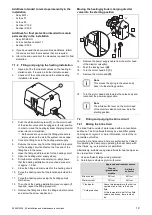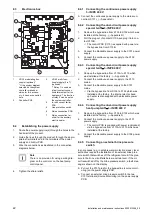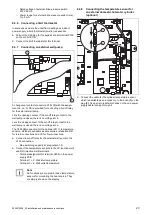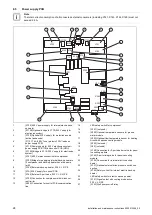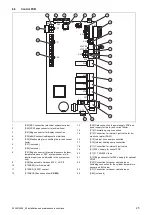
0020213394_05 Installation and maintenance instructions
21
8
Electrical installation
Danger!
Risk of death from electric shock caused
by a residual-current circuit breaker not
working.
In certain cases, residual-current circuit
breakers may not work.
▶
If it is stipulated for the installation site,
for the product, install a pulse-current-
sensitive type A residual-current circuit
breaker or a universal-current-sensitive
type B residual-current circuit breaker.
Only qualified electricians may carry out the electrical install-
ation.
▶
Observe the technical connection conditions for connect-
ing to the energy supply company's low-voltage network.
▶
Use the values for the maximum rated power that are
specified in the technical data to determine the required
cable cross-sections.
▶
In each case, take into consideration the (on-site) install-
ation conditions.
▶
Connect the product using a fixed connection and an
electrical partition with a contact gap of at least 3 mm
(e.g. fuses or power switches).
▶
Install the electrical partition right next to the heat pump.
▶
For the power supply, in accordance with the data plate,
connect the product, in phase, to a 400 V AC three-
phase network with a neutral conductor and an earth
conductor.
▶
Fuse-protect this connection using the exact values that
are specified in the technical data.
▶
If the local energy supply company requires that the heat
pump is controlled using a blocking signal, install a cor-
responding contact switch as prescribed by the energy
supply company.
▶
Ensure that the sensor cables, e. g. for the VRC DCF
receiver, do not exceed the maximum line length of 50 m.
▶
At lengths of 10 m or more, mains voltage connection
cables must be laid separately from sensor or bus lines.
Minimum clearance for the extra low voltage wire and
power supply cable at a line length of > 10 m: 25 cm. If
this is not possible, use shielded cables. Lay the shield-
ing on one side of the sheet for the product's electronics
box.
▶
Do not use free terminals on the heat pump as base ter-
minals for further wiring.
30 mm max.
1
2
1
Connecting wires
2
Insulation
▶
Only strip a maximum of 3 cm from the outer sheathing of
the flexible ducts.
▶
Secure the conductors in the connection terminals.
–
Max. torque of the connection terminals: 1.2 Nm
8.1
Routing eBUS lines
1.
Route the eBUS lines in a star formation from a junc-
tion box to the individual products.
2.
Ensure that you do not route the eBUS lines parallel to
the power supply cables.
–
Piping diameter:
≥
0.75 mm
²
8.2
Opening the electronics box
A
C
B
1.
Unscrew the screw.
2.
Pull the bottom of the cover forwards and lift it up-
wards.













